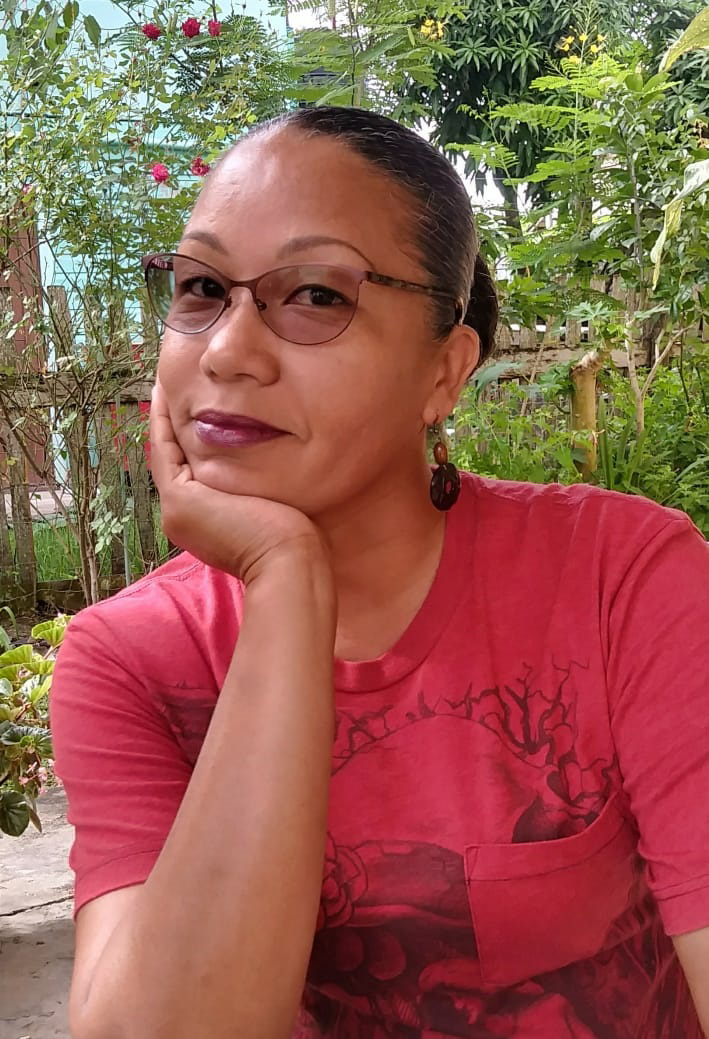Cosmata Lindie is an artist, writer and clerical assistant from New Amsterdam, Berbice. First featured in The Writers’ Room last August for her short story The Birds, Lindie’s Crossroads is a tale of hope and redemption, and having the courage to start again when it feels like everything is falling apart.
TWR: Crossroads, unlike your first published piece, The Birds, is presented as a sort of fable. Why did you think it was important for the story to be told in this particular way?
CL: Crossroads came about like most of my stories do— suddenly. I get inspiration from different things; in this case I’d watched a movie that had a reference to Robert Johnson, the American blues singer who, legend says, sold his soul to the Devil at a crossroads one night in exchange for his ability to play the guitar. It gave me a sudden idea to write a story about a man at a crossroads prepared to sacrifice his soul. I wanted it to be lighthearted but with a serious message too. I actually hadn’t thought of it as a fable but I like the fact that it is seen as such, as I have read many of Aesop’s and other fables and find them to be a most direct method of storytelling that pairs an enjoyable tale with a relatable life message or lesson. In the spirit of the new year I wanted to send a message of hope.
TWR: In the story the lesson seems to be that it is never too late for redemption. Was the dawn of the new year and the ‘resolutionist’ nature we take on around that time the main inspiration for the story? Or was this another opportunity to explore the themes of death and transformation?
CL: Yes. The story was written in late December last year and I wanted to wrap up a package of hope, redemption and new possibilities that tied both the old year and the new into one story. The themes of death and transformation are as much present in Crossroads as in The Birds, since Maurice is leaving his old life behind and is resolved to begin a new one, similar to the girl in The Birds dying and being reborn in a new form. But where The Birds was dark, Crossroads is meant to be lighter and more cheerful. More of a fairy tale, if you wish.
TWR: Another important theme that emerges in Crossroads is that of growth and the notion that we grow and learn from experience. In a nutshell, what do you hope readers will take away from this piece?
CL: I would like readers to leave with a feeling that no obstacle in life cannot be overcome if a person is willing to see where they may have gone wrong and can find the courage to leave that path and begin a new one. Hope, courage and determination are what are needed.
TWR: The protagonist, Maurice Saul, believes that he has made such a mess of his life that his soul is worthless. He decides to sell his soul to undo some of his mistakes. However, you never explicitly mention what his character did. What was the intent behind this omission?
CL: That was deliberate. Maurice could be anyone and not stating exactly what he did that brought him to the crossroads leaves the reader free to create whatever they wish. I satisfied myself by just giving hints that whatever it was he had done was pretty terrible and hurt not just him, but the people he loved too. Which is often the case with people who wreck their own lives, other people suffer from the fallout too.
TWR: Do you truly believe there is no such thing as an “irredeemable life”?
CL: Yes, I do believe that as long as a person can accept responsibility for wrongs they have done and is willing to make amends then their lives can be redeemed. And I don’t necessarily mean in a religious way, though that works for some people. I mean they can turn their lives around and become a better future person.
TWR: On the point of resolutions, have you made any this year with regards to your writing?
CL: I do hope to write a few more stories this year and get serious about putting them together for publication. Fingers crossed that I keep that resolution.
TWR: What books/authors would you recommend to anyone seeking to inspire transformation in their own lives or in the way they view and/or produce their art?
CL: I have read hundreds of books but here are a few that left a lasting impression on me: The Power of Myth, Fahrenheit 451, The Fellowship of the Ring, Wuthering Heights, Jane Eyre, Cannery Row, The Moonflower Vine, Jungle Cowboy, Les Miserables, Naked Came I and Heart of Darkness.






